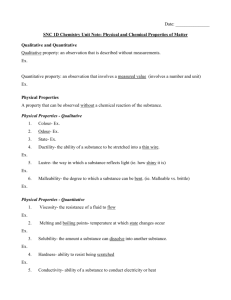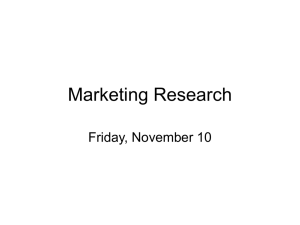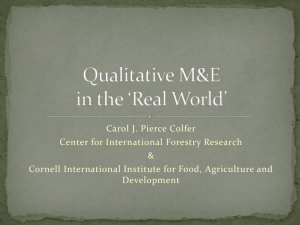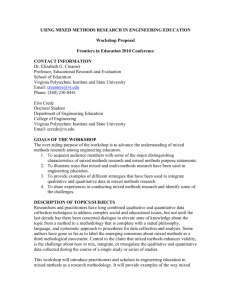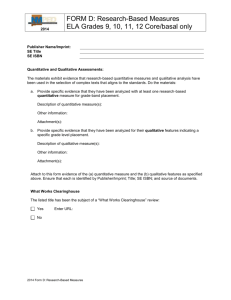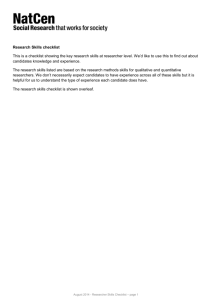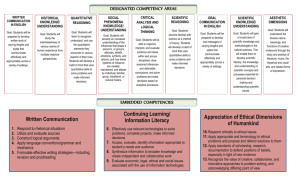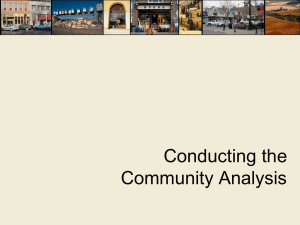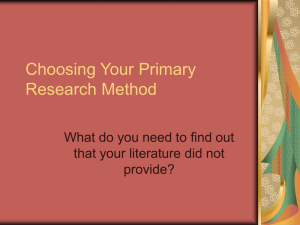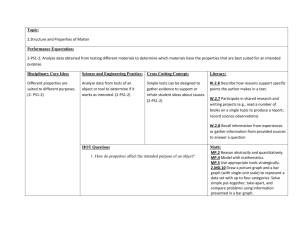Writing the Evaluation Your Evaluation can include visual material
advertisement
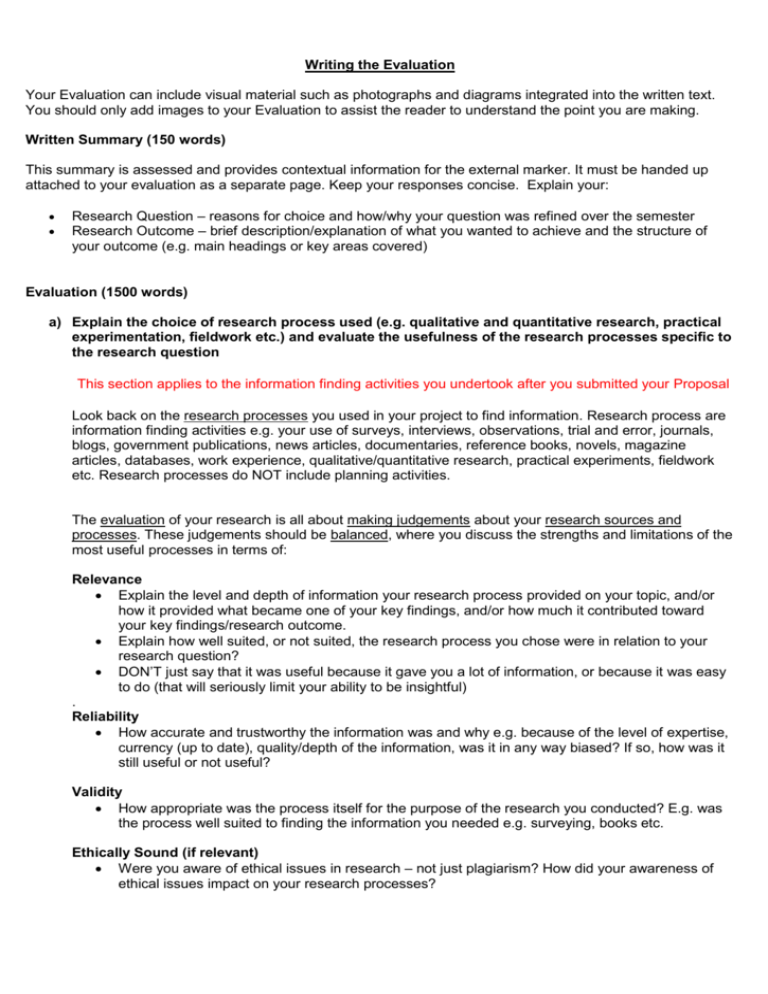
Writing the Evaluation Your Evaluation can include visual material such as photographs and diagrams integrated into the written text. You should only add images to your Evaluation to assist the reader to understand the point you are making. Written Summary (150 words) This summary is assessed and provides contextual information for the external marker. It must be handed up attached to your evaluation as a separate page. Keep your responses concise. Explain your: Research Question – reasons for choice and how/why your question was refined over the semester Research Outcome – brief description/explanation of what you wanted to achieve and the structure of your outcome (e.g. main headings or key areas covered) Evaluation (1500 words) a) Explain the choice of research process used (e.g. qualitative and quantitative research, practical experimentation, fieldwork etc.) and evaluate the usefulness of the research processes specific to the research question This section applies to the information finding activities you undertook after you submitted your Proposal Look back on the research processes you used in your project to find information. Research process are information finding activities e.g. your use of surveys, interviews, observations, trial and error, journals, blogs, government publications, news articles, documentaries, reference books, novels, magazine articles, databases, work experience, qualitative/quantitative research, practical experiments, fieldwork etc. Research processes do NOT include planning activities. The evaluation of your research is all about making judgements about your research sources and processes. These judgements should be balanced, where you discuss the strengths and limitations of the most useful processes in terms of: Relevance Explain the level and depth of information your research process provided on your topic, and/or how it provided what became one of your key findings, and/or how much it contributed toward your key findings/research outcome. Explain how well suited, or not suited, the research process you chose were in relation to your research question? DON’T just say that it was useful because it gave you a lot of information, or because it was easy to do (that will seriously limit your ability to be insightful) . Reliability How accurate and trustworthy the information was and why e.g. because of the level of expertise, currency (up to date), quality/depth of the information, was it in any way biased? If so, how was it still useful or not useful? Validity How appropriate was the process itself for the purpose of the research you conducted? E.g. was the process well suited to finding the information you needed e.g. surveying, books etc. Ethically Sound (if relevant) Were you aware of ethical issues in research – not just plagiarism? How did your awareness of ethical issues impact on your research processes? Explain which process was of most value to you and why? Why was it more valuable than others? What were the limitations of your research processes? What research process didn’t you use that now, looking back, you think you should have? Why? Clearly articulate the links between the RP question and the research process, with an analysis of why/why not it was successful Be balanced, objective and measured in your evaluation. Don’t overdo emotive and personal comments. Use subject-specific language e.g. qualitative, quantitative, primary, secondary etc. b) Evaluate the decisions you made in response to challenges and/or opportunities specific to the research processes used (e.g. major activities, insights, turning points and problems encountered) Think deeply about what helped and/or hindered your research. What were your challenges and/or opportunities? How did these arise? How and why did you respond to them in the manner you did? How did they shape the direction of your research? How did they lead to key findings and/or turning points? Where there any lost opportunities? Each challenge should be discussed in 3 parts: 1. Identify the challenge 2. What did you do about it? 3. What was the consequence of this decision? How did this decision impact on your research question and the direction that your research took? This section relates to research process only (not planning, organisation, time management) Do not include ‘should have’, ‘would have’ statements c) Reflect on the quality of your Research Outcome Do not get side tracked by explaining in detail what your key findings were. Be honest and give a balanced assessment. Reflect on the findings in terms of your increased knowledge and skills about the topic e.g. new ideas or understandings. What did you know before and what do you know now? If you have found nothing new, then say so and/or point out limitations in your research e.g. what was not investigated What have you discovered that is new/different and where do you believe gaps in knowledge still appear to exist in relation to the topic. Are there areas that further research could investigate? How was your research question ‘well resolved’? Reflect on how successfully you answered your research question. Evaluate the ‘completeness’ of your outcome. Evaluate the effectiveness of your key findings. This assumes that your key findings are clearly articulated in their outcome d) Information organised coherently and ideas communicated accurately and appropriately An assessment will also be made on how well you express your ideas and how logically your Evaluation is structured. Language and expression must be reasonably sophisticated to achieve a high grade in this area Ideas are well organised and the structure is logical and easy to follow/fluent to read Expression: choice of words, spelling, grammar and meaning is clear. Punctuation is correct. You may need to include a reference list if you discuss specific information sources


